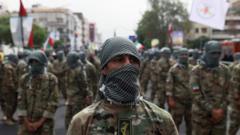Recent reports indicate a disturbing trend where Iran’s authorities utilize criminal organizations to carry out extrajudicial activities abroad, raising significant international security concerns.
**Iran's Covert Campaign: Alliance with Criminal Gangs for Foreign Operations**

**Iran's Covert Campaign: Alliance with Criminal Gangs for Foreign Operations**
Western intel reveals Iran’s Revolutionary Guard leveraging organized crime for overseas hits on dissidents.
In a worrying escalation of tactics, the Iranian regime has reportedly been collaborating with criminal gangs to execute kidnappings and assassinations internationally. Intelligence agencies from the US and Israel have documented an increase in such attempts targeting dissidents, journalists, and political adversaries living abroad, particularly since last year.
Court records acquired by BBC Eye Investigations and BBC Persian reveal the use of these criminal networks by Iran's Islamic Revolutionary Guard Corps (IRGC), contradicting previous claims from Iranian officials. One name frequently mentioned in these documents is Naji Sharifi Zindashti, a notorious figure linked to drug trafficking, who is suspected of orchestrating hits on foreign soil.
Zindashti's criminal activities have caught the attention of authorities globally, highlighting his alleged involvement in the assassination of Saeed Karimian, the founder of a Persian television channel, in Istanbul in 2017. Accusations suggest that he retained connections with Iranian intelligence, especially as many of the victims of these operations had been deemed threats to the Islamic regime.
In a separate case in 2020, Zindashti's name surfaced again during a kidnapping plot involving Iranian dissident Habib Chaab, who was later executed after being broadcast on Iranian state television. His ties to the Iranian regime were further illustrated when he was implicated in a separate assassination plot on US soil, where he allegedly plotted to kill Iranian defectors in Maryland.
The IRGC's involvement in coordinating these activities has become clear through various collaborations with international criminal organizations, such as the Thieves-in-Law. Recent incidents, including attempted attacks on Iranian-American activists, emphasize the immediate threat posed by these emerging alliances.
In response to this concerning trend, both the US and UK have imposed sanctions on individuals connected to these intelligence operations, with continued vigilance being advised. Authorities are increasingly alert to the potential for Iranian agents to infiltrate criminal networks, complicating efforts to thwart such plots where strategies to obscure governmental involvement are employed.
Increasingly over the years, the Iranian regime has resorted to criminal avenues to execute actions that align with their interests while maintaining plausible deniability. This strategic shift has raised alarms about a new phase of Iran’s external national security strategy, suggesting a new era of state-sponsored criminality as a means to silence dissent and protect regime interests.
Court records acquired by BBC Eye Investigations and BBC Persian reveal the use of these criminal networks by Iran's Islamic Revolutionary Guard Corps (IRGC), contradicting previous claims from Iranian officials. One name frequently mentioned in these documents is Naji Sharifi Zindashti, a notorious figure linked to drug trafficking, who is suspected of orchestrating hits on foreign soil.
Zindashti's criminal activities have caught the attention of authorities globally, highlighting his alleged involvement in the assassination of Saeed Karimian, the founder of a Persian television channel, in Istanbul in 2017. Accusations suggest that he retained connections with Iranian intelligence, especially as many of the victims of these operations had been deemed threats to the Islamic regime.
In a separate case in 2020, Zindashti's name surfaced again during a kidnapping plot involving Iranian dissident Habib Chaab, who was later executed after being broadcast on Iranian state television. His ties to the Iranian regime were further illustrated when he was implicated in a separate assassination plot on US soil, where he allegedly plotted to kill Iranian defectors in Maryland.
The IRGC's involvement in coordinating these activities has become clear through various collaborations with international criminal organizations, such as the Thieves-in-Law. Recent incidents, including attempted attacks on Iranian-American activists, emphasize the immediate threat posed by these emerging alliances.
In response to this concerning trend, both the US and UK have imposed sanctions on individuals connected to these intelligence operations, with continued vigilance being advised. Authorities are increasingly alert to the potential for Iranian agents to infiltrate criminal networks, complicating efforts to thwart such plots where strategies to obscure governmental involvement are employed.
Increasingly over the years, the Iranian regime has resorted to criminal avenues to execute actions that align with their interests while maintaining plausible deniability. This strategic shift has raised alarms about a new phase of Iran’s external national security strategy, suggesting a new era of state-sponsored criminality as a means to silence dissent and protect regime interests.



















